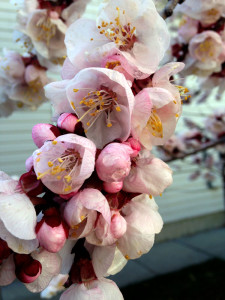Thoughts on Conflict
I recently found myself in conversation with a person with whom I could not agree. The conversation ended more with final statements than an accord. I’ve given much thought to it over several days because one of the aspects of my anxiety is that I will re-play, re-script, review any contentious conversation for several days after it happens. I am not able to be done with a conversation and walk away. It chases after me and interferes with my ability to think about anything else. A contentious conversation impedes my ability to work for as much as a week. Sometimes, years later, the memory of contention will suddenly drop into the middle of my mind along with a stab of adrenaline as my body is momentarily convinced that the unavoidable outcome of this contention is doom, or death, or failure.
The person to whom I was talking does not have any of these anxiety issues. Because he does not, and because of some innate rigidity of belief, he was incapable of understanding where I was coming from. He felt like he should be able to say whatever he wanted to say and if other people didn’t like it, they could just walk away unaffected. He can do this and assumes that all humans have that capability. I know, to my bones, that sometimes words chase people down and haunt them. Words are sharp implements that can cut people if they’re used carelessly. Both of our beliefs feel irrefutable because they come directly from our own experiences.
Sadly, I’ve come to realize that when the source of conflict is between the fundamental beliefs of one person and another, the conflict can’t really be resolved other than by agreeing to disagree. Sometimes it means the people simply can’t be around each other without hurting each other constantly. We all have issues on which we can’t bend without becoming something other than what we are. We all have places where we are rigid. The tricky part is that the core of a conflict is not always apparent. It is usually wrapped up in some tangential event. Sometimes a conflict is a problem of word choice muddling a fundamental agreement. Those can be sorted by definition of terms and ongoing conversation. Occasionally conflict results in an expansion of mind in both parties, but this requires both parties to be willing to be vulnerable instead of defensive.
In all cases I find that my most useful response to conflict is to take a step backward and consider “what is really the conflict here?” Because I’ve had fights over cheese which were actually about disrespect and loneliness. In each case I have to figure out why I am so upset, which helps me to see why the other person might be as well. Because I know that my brain lies to me, I have to consider that my reaction might have more to do with brain chemistry than the conversation. I had to walk away from a conversation with Howard last week because he was talking about furniture and my brain was interpreting his every word as evidence of my failure as a human being. So I stopped him and walked away, which was frustrating for him. I had to go off by myself and detach furniture choices from my sense of self worth. In that pause I was able to recognize the emotional hole which was affecting me that day. Then we started the conversation fresh and talked about the hole I’d found. There were apologies, plans for keeping holes filled, and we were able to discuss furniture without emotional baggage. Classic example of fundamental agreement being clouded by emotions and words.
Once I can see the core conflict, I have to evaluate whether it actually needs to be resolved at all. This week’s conversation was with a person I don’t have to interact with much. I can just interact less without impacting my life. There are some other ongoing conflicts I’m juggling with people where I greatly value the relationships. My son and I have some very different beliefs about how he can succeed at being an adult. We’ve developed a neutral ground and a vocabulary where I can continue to advocate for my view and he advocates for his. Sometimes we get angry, but both of us value our relationship more than we value being right. When things get too angry we back off and focus on the parts of our lives where we are in complete agreement.
People are complicated. We all carry around heads full of unexamined opinions. We’re formed by our genetics and our upbringing. We’re further shaped by the communities where we spend our time and by how those communities treat us. None of it is fair. Some people have to struggle more than others. Everyone struggles with something. And we’re all a bit myopic because, while experience can teach us how to see some other points of view, no one has enough experience to see all points of view. This means that we will disappoint each other and hurt each other. There will be times when we can’t comprehend another person’s decisions because they are working from entirely different premises for how life functions. It also means that the world is full of people from whom we can learn. We are constantly surrounded with the opportunity for empathy and expanded vision. It is wonderful, heartbreaking, exhausting. It is why curling up under the covers and never coming out again sounds so attractive for folks like me who have panic attacks when we think we’ve disappointed someone.
Conflict is inevitable. That made me sad and scared for a long time. I didn’t want conflict. Ever. Then I got older and realized that the times when I really expanded and became bigger, stronger, more than I was before, all came from conflict. Conflict with another human being is an opportunity for both of the people to grow. I try to remember that when I find myself in the middle of a conflict I did not want.
Thoughts on Conflict Read More »
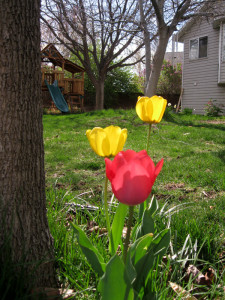 I’ve had tulips for as long as I’ve owned this house (18 years and counting). There was an abundance of them in the front flowerbed the first spring after I moved in. The thing with tulips is that most varieties of them will only come back for a few years before dying out. There are a few exceptions, mostly in bright yellow and solid red. Over the years I’ve dug up beds, redistributed tulip bulbs, bought new bulbs, and generally been a disturber of the earth. Some years I tend my flowers. Other years only the fittest will survive the incursion of weeds and neglect. Yet I’ve always had yellow tulips because they persistently grow and spread. One patch will die out, but another will thrive. In my backyard, yellow tulips are the only ones I have because I’ve not taken time to re-plant other colors. Except this spring I looked out my back window and saw a surprise. Pink tulips in my backyard flower beds. There are three of them in three different places and I don’t know how they got there. I’ve never seen pink in the back garden before. I know I didn’t do any planting last fall.
I’ve had tulips for as long as I’ve owned this house (18 years and counting). There was an abundance of them in the front flowerbed the first spring after I moved in. The thing with tulips is that most varieties of them will only come back for a few years before dying out. There are a few exceptions, mostly in bright yellow and solid red. Over the years I’ve dug up beds, redistributed tulip bulbs, bought new bulbs, and generally been a disturber of the earth. Some years I tend my flowers. Other years only the fittest will survive the incursion of weeds and neglect. Yet I’ve always had yellow tulips because they persistently grow and spread. One patch will die out, but another will thrive. In my backyard, yellow tulips are the only ones I have because I’ve not taken time to re-plant other colors. Except this spring I looked out my back window and saw a surprise. Pink tulips in my backyard flower beds. There are three of them in three different places and I don’t know how they got there. I’ve never seen pink in the back garden before. I know I didn’t do any planting last fall. 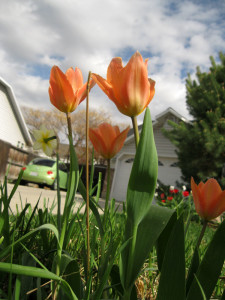 This is one of the things I love about seeing my garden year after year. It always changes. There is always some surprise or a new manifestation. This trio of apricot-colored tulips used to be giant and in classic tulip shape. Yet this year they are small and airy. It probably means that in another year or so they’ll vanish as tulip varieties so often do. Then I’ll plant some other tulip in that spot, or perhaps the lilies will take over. Each spring my flowerbeds change. They are different than the year before.
This is one of the things I love about seeing my garden year after year. It always changes. There is always some surprise or a new manifestation. This trio of apricot-colored tulips used to be giant and in classic tulip shape. Yet this year they are small and airy. It probably means that in another year or so they’ll vanish as tulip varieties so often do. Then I’ll plant some other tulip in that spot, or perhaps the lilies will take over. Each spring my flowerbeds change. They are different than the year before.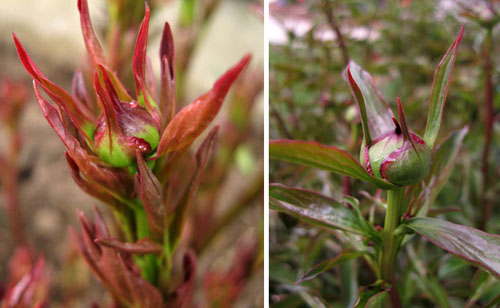
 I wish that the serendipity of unexpected beauty were as easy to see as in my garden. I wish that emotional growth and development in my children were as simple to spot and photograph as the buds of my flowers. I wish that life made it easier to see that sad things sometimes have to happen because without them future happiness can’t be. I wish these things, but for now I’ll walk my flower beds and feel that the sorts of things I see there are happening in other parts of my life as well. Life is full of beautiful growth, but I won’t see it unless I stop and pay attention.
I wish that the serendipity of unexpected beauty were as easy to see as in my garden. I wish that emotional growth and development in my children were as simple to spot and photograph as the buds of my flowers. I wish that life made it easier to see that sad things sometimes have to happen because without them future happiness can’t be. I wish these things, but for now I’ll walk my flower beds and feel that the sorts of things I see there are happening in other parts of my life as well. Life is full of beautiful growth, but I won’t see it unless I stop and pay attention.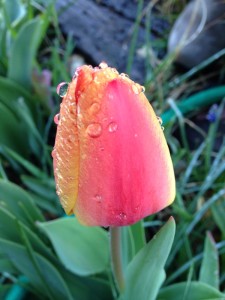 In April the fact of spring becomes obvious. This makes my heart happy. Yet I have a habit of being tangled up inside my own head and failing to notice the world around me. This is particularly true since I don’t have to leave my house to go to work. There was one year where I looked up at the beginning of May and realized that I had completely missed daffodil and tulip season. This year I plan to pay attention. The world is full of small beautiful things that exist whether or not I take time to see them, but my life is enriched when I take time to notice. And some of them do get more beautiful for my attention. The flowers in my gardens grow stronger, bigger, more beautiful when I take time to pull weeds and scatter fertilizer.
In April the fact of spring becomes obvious. This makes my heart happy. Yet I have a habit of being tangled up inside my own head and failing to notice the world around me. This is particularly true since I don’t have to leave my house to go to work. There was one year where I looked up at the beginning of May and realized that I had completely missed daffodil and tulip season. This year I plan to pay attention. The world is full of small beautiful things that exist whether or not I take time to see them, but my life is enriched when I take time to notice. And some of them do get more beautiful for my attention. The flowers in my gardens grow stronger, bigger, more beautiful when I take time to pull weeds and scatter fertilizer.
